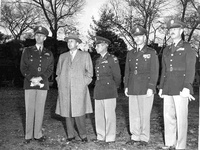“There certainly was doubt but I can’t remember anything coming of it,” he says.
Charles Ufford ’53 was raised a Quaker and, according to the tenets of his religion, registered as a conscientious objector when his draft examination rolled around at age 18.
But by the end of his time at Harvard, he dropped his conscientious objector listing and filed a student deferral. Ufford says he felt he needed to serve.
But, he says, his decision was more about him being personally ready to serve, and not about necessarily coming around to support the political cause.
“It was largely independent of the U.S. policy or its policy or opposing the North Korean invasion,” he says. He says he had a “great realization” that his initial resistance to the war did not stem from his personal convictions, but rather was handed down to him from the leaders of his church.
“It was that feeling of being somehow different, and then as a I got older, year by year, it seemed to me that my activities and outlook on things were really not so much different from all my contemporaries,” he says.
Some student groups on campus were addressing the matter, but not significantly.
Richard A. Richmond ’53 says he thinks that the lack of 24-hour media may have also contributed to the tempered debate—students were not often subjected to images of war, nor were they able to follow the events in Korea minute-by-minute.
“It strikes me now for the first time that there was no opposition for the war,” says Consolini. He described the sentiment as a kind of “What are you going to do? Are you going to be weak or are you going to stand up and be counted?”
Even the part of the war that struck closest to home for Harvard students—the draft—merely “annoyed” the campus, as The Crimson reported.
On Monday, Sept. 22, 1952, the day after the Class of ’53 registered for their final year of college, The Crimson published a story about a poll of 5,000 students in top colleges across the nation. The story ran with the headline: “Student Poll Reveals Harvard Men Annoyed by Draft—Like Everyone.”
In the article, the Cornell professor who ran the poll compared students’ attitudes toward the war with his father’s toward his taxes.
“He meets his obligation but he doesn’t necessarily like it,” he said.
During the Vietnam war, students at Harvard and across the nation protested the draft. Even during the recent military action in Iraq, a Crimson poll revealed wide opposition to the war among students, in sharp contrast to rest of the nation.
But at Harvard in 1953—despite the University’s image as a hotbed of raging leftists and snooty intellectuals—students were no more opposed to or offended by the draft than at any other comparable college.
“The Harvard responses,” wrote the article’s author, “were what you might call typically American.”
—Staff writer Alexandra N. Atiya can be reached at atiya@fas.harvard.edu.









